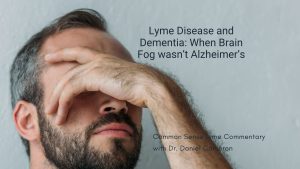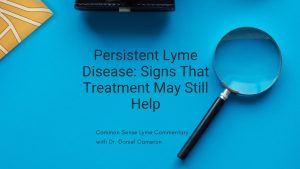Call for your appointment today 914-666-4665 | Mt. Kisco, New York

Researchers at the Azzolino Clinic in San Francisco, California “identified an alarming number of individuals suffering from post-concussion syndrome (PCS), that are refractory to care and that have serologically tested positive for Lyme disease.” [1]
“Furthermore, we have witnessed a dramatic improvement in function and reduction in disability following treatment of these patients,” writes Azzolino and colleagues.
The authors, based on their observations, wondered, What is the prevalence of Lyme disease and co-infections in PCS patients, specifically in those who are still symptomatic at least 1 year after their traumatic brain injury?
And could symptoms be due to an “ongoing undiagnosed and untreated Lyme disease or associated co-infection?”
Azzolino and colleagues identified 217 PCS patients who did not respond to TBI treatment and had tested positive for Lyme disease by IgM Western blot using IGeneX laboratory.
[bctt tweet=”Study looks at the prevalence of Lyme disease in patients with post-concussion syndrome, who do not respond to treatment. ” username=”DrDanielCameron”]
To be included in the study: patients had to have at least 1 PCS symptom (e.g., headache, irritability, dizziness, vertigo, difficulty concentrating) for more than 1 year and a negative brain computed tomography (CT) or magnetic resonance imaging (MRI) scan.
Participants were excluded if: they had previously tested positive for Lyme and/or co-infections; had 2 weeks of antibiotics since the date of injury; had been diagnosed with a primary neurological illness (e.g., seizure disorder or multiple sclerosis), or had post-stroke syndrome.
Out of the 217 patients, “38% had a positive Western blot IGeneX IgM.”
“There was a statistically significant relationship of a positive Western blot IGeneX IgM predicting chronic PCS,” writes Azzolino.
“It is likely that [antibiotic treatment for Lyme disease], could also alleviate symptoms such as cognitive disturbances, dizziness, and fatigue,” writes Azzolino.
Additionally, “Given the cost of interventions for PCS, the diagnosis and treatment of co-morbid infections could prove to have a significant impact on the standard of care of PCS.”
Editor’s Note: The study is limited by its reliance on a Western blot from IGeneX laboratory and the absence of a positive IgG Western blot test. This study requires further replication.
Related Articles:
Neurological damage/dysfunction found in early Lyme disease patients
References:
- Azzolino S, Zaman R, Hankir A, Carrick FR. The prevalence of Lyme disease and associated co-infections in people with a chronic post-concussive syndrome. Psychiatr Danub. 2019;31(Suppl 3):299-307.




This makes perfect sense to me! I had a concussion and then about 8 months later was diagnosed with Lyme Disease. 6 years later still have multiple symptoms and complications!
Jeannie, have you had any improvements since your post?
What doctors & treatment can you recommend? It is so heartbreaking to see my daughter go through this … we’ve seen 2 amazing lyme doctors already amongst many others and she still is fighting for her life back !
Almost same exact here